全球化的利弊-英语
全球化的利弊英语作文

全球化的利弊英语作文英文回答:Globalization, as a phenomenon, has both its advantages and disadvantages. On one hand, it has brought about increased interconnectedness and interdependence among countries, leading to greater cultural exchange and economic cooperation. This has resulted in the spread of ideas, technology, and products across the globe,benefiting many people in terms of access to new opportunities and resources. For example, the rise of multinational corporations has created job opportunitiesfor people in developing countries, lifting many out of poverty.On the other hand, globalization has also led to the homogenization of cultures and the loss of traditional values and practices. The dominance of Western culture, for instance, has led to the erosion of local traditions and languages in many parts of the world. Moreover, theinterconnectedness of economies has made countries more vulnerable to global economic crises, as seen in the 2008 financial crisis and the current COVID-19 pandemic. This has resulted in widespread job losses and economic instability in many countries.In addition, globalization has also contributed to environmental degradation, as the increased movement of goods and people has led to greater carbon emissions and resource depletion. The pursuit of economic growth and profit has often come at the expense of the environment, leading to issues such as deforestation, pollution, and climate change.中文回答:全球化作为一种现象,既有其优点,也有其缺点。
全球化利弊英语作文
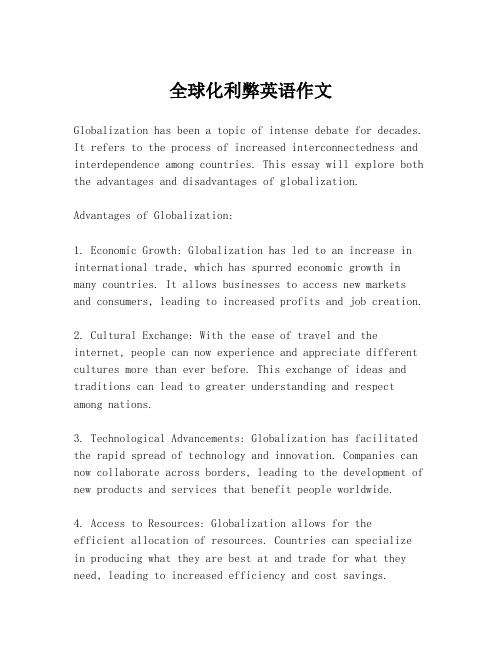
全球化利弊英语作文Globalization has been a topic of intense debate for decades. It refers to the process of increased interconnectedness and interdependence among countries. This essay will explore both the advantages and disadvantages of globalization.Advantages of Globalization:1. Economic Growth: Globalization has led to an increase in international trade, which has spurred economic growth in many countries. It allows businesses to access new markets and consumers, leading to increased profits and job creation.2. Cultural Exchange: With the ease of travel and the internet, people can now experience and appreciate different cultures more than ever before. This exchange of ideas and traditions can lead to greater understanding and respect among nations.3. Technological Advancements: Globalization has facilitated the rapid spread of technology and innovation. Companies can now collaborate across borders, leading to the development of new products and services that benefit people worldwide.4. Access to Resources: Globalization allows for theefficient allocation of resources. Countries can specializein producing what they are best at and trade for what they need, leading to increased efficiency and cost savings.5. Educational Opportunities: Students can now study abroad more easily, gaining exposure to different educational systems and broadening their horizons. This can lead to a more skilled and globally aware workforce.Disadvantages of Globalization:1. Job Displacement: While globalization creates jobs, it can also lead to job losses, particularly in industries that can be outsourced to countries with lower labor costs. This can lead to unemployment and economic instability in certain regions.2. Cultural Homogenization: The spread of global brands and media can lead to a loss of local culture and identity. Some argue that this results in a loss of cultural diversity and uniqueness.3. Environmental Concerns: The increased production and transportation associated with globalization can lead to environmental degradation. Issues such as pollution and climate change are exacerbated by the global scale of industrial activities.4. Economic Inequality: While some benefit greatly from globalization, others are left behind. Wealth disparities can increase, both within and between countries, leading tosocial unrest and dissatisfaction.5. Dependency on Foreign Markets: Countries that rely heavilyon international trade can be vulnerable to economic downturns in other parts of the world. This can lead to economic instability and a lack of self-sufficiency.In conclusion, globalization offers numerous benefits such as economic growth, cultural exchange, and technological advancements. However, it also presents challenges such as job displacement, cultural homogenization, and environmental concerns. It is crucial for policymakers and stakeholders to address these issues to ensure that globalization is sustainable and beneficial for all.。
全球化的利弊英语作文
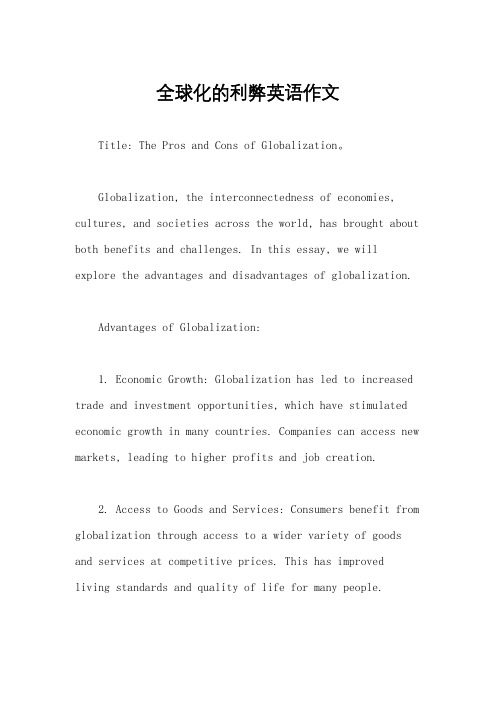
全球化的利弊英语作文Title: The Pros and Cons of Globalization。
Globalization, the interconnectedness of economies, cultures, and societies across the world, has brought about both benefits and challenges. In this essay, we will explore the advantages and disadvantages of globalization.Advantages of Globalization:1. Economic Growth: Globalization has led to increased trade and investment opportunities, which have stimulated economic growth in many countries. Companies can access new markets, leading to higher profits and job creation.2. Access to Goods and Services: Consumers benefit from globalization through access to a wider variety of goods and services at competitive prices. This has improvedliving standards and quality of life for many people.3. Cultural Exchange: Globalization facilitates the exchange of ideas, values, and cultural practices among nations. This cultural diversity enriches societies and promotes understanding and tolerance among people from different backgrounds.4. Technological Advancement: Globalization has spurred innovation and technological advancement by encouraging collaboration and knowledge sharing across borders. This has resulted in improvements in various fields, including healthcare, communication, and transportation.5. Global Cooperation: Global challenges such as climate change, terrorism, and pandemics require international cooperation. Globalization has fostered closer ties between nations, enabling them to work together to address common issues.Disadvantages of Globalization:1. Growing Economic Inequality: While globalization has led to overall economic growth, it has also widened the gapbetween the rich and the poor within and between countries. Some regions and social groups have been left behind, exacerbating poverty and inequality.2. Cultural Homogenization: The spread of global media and consumer culture has led to the erosion of localcultures and traditions. This cultural homogenization can result in the loss of cultural diversity and identity.3. Environmental Degradation: The pursuit of economic growth in a globalized world has often come at the expenseof the environment. Industrialization, deforestation, and pollution have led to environmental degradation and climate change, threatening the planet's sustainability.4. Exploitation of Workers: Globalization has led tothe outsourcing of jobs to countries with lower labor costs, where workers may be exploited and subjected to poorworking conditions. This has raised concerns about labor rights and social justice.5. Vulnerability to Economic Shocks: Interconnectedglobal markets can magnify the impact of economic crises and financial instability. A downturn in one part of the world can quickly spread to others, leading to widespread economic turmoil and hardship.In conclusion, while globalization has brought about significant benefits in terms of economic growth, cultural exchange, and technological advancement, it also poses challenges such as economic inequality, cultural homogenization, environmental degradation, exploitation of workers, and vulnerability to economic shocks. It is essential for policymakers to address these challenges while harnessing the opportunities presented by globalization to create a more inclusive, sustainable, and prosperous world for all.。
全球化优缺点英文版
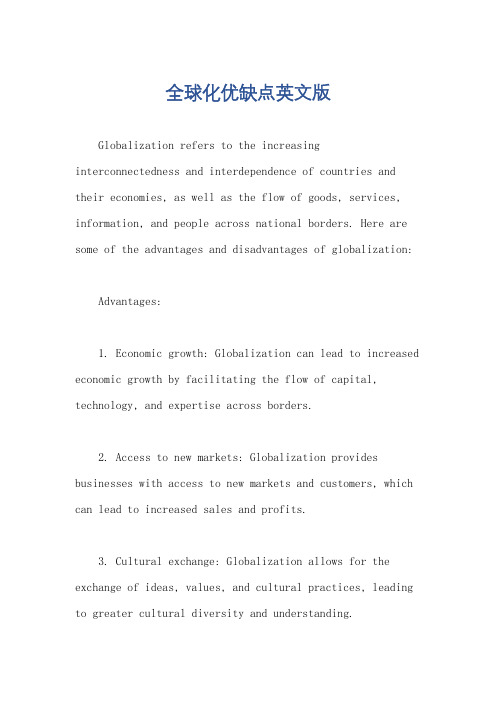
全球化优缺点英文版Globalization refers to the increasing interconnectedness and interdependence of countries and their economies, as well as the flow of goods, services, information, and people across national borders. Here are some of the advantages and disadvantages of globalization:Advantages:1. Economic growth: Globalization can lead to increased economic growth by facilitating the flow of capital, technology, and expertise across borders.2. Access to new markets: Globalization provides businesses with access to new markets and customers, which can lead to increased sales and profits.3. Cultural exchange: Globalization allows for the exchange of ideas, values, and cultural practices, leading to greater cultural diversity and understanding.4. Innovation: Globalization can foster innovation by allowing for the exchange of knowledge and best practices across different countries and industries.Disadvantages:1. Growing inequality: Globalization can exacerbate income inequality within and between countries, as wealth and opportunities may be concentrated in the hands of a few.2. Environmental impact: Globalization can lead to increased environmental degradation due to the expansion of production and consumption, as well as the transportationof goods over long distances.3. Loss of cultural identity: Globalization can lead to the homogenization of cultures, as local traditions and customs may be overshadowed by globalized consumer culture.4. Vulnerability to global shocks: Globalization can make countries more vulnerable to global economic andfinancial shocks, as well as health crises and other global challenges.In conclusion, while globalization has brought about many benefits such as economic growth and cultural exchange, it also presents challenges such as growing inequality and environmental impact. It is important for policymakers and stakeholders to address these challenges in order to ensure that the benefits of globalization are shared moreequitably and sustainably.。
全球化的利弊英语作文
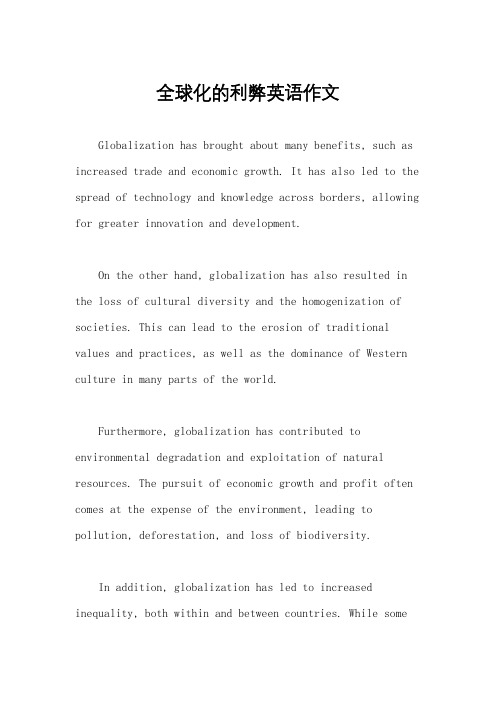
全球化的利弊英语作文Globalization has brought about many benefits, such as increased trade and economic growth. It has also led to the spread of technology and knowledge across borders, allowing for greater innovation and development.On the other hand, globalization has also resulted in the loss of cultural diversity and the homogenization of societies. This can lead to the erosion of traditional values and practices, as well as the dominance of Western culture in many parts of the world.Furthermore, globalization has contributed to environmental degradation and exploitation of natural resources. The pursuit of economic growth and profit often comes at the expense of the environment, leading to pollution, deforestation, and loss of biodiversity.In addition, globalization has led to increased inequality, both within and between countries. While somehave benefited greatly from globalization, many others have been left behind, leading to social unrest and political instability.Moreover, globalization has also contributed to the spread of diseases and pandemics, as people and goods move more freely across borders. This can pose significant challenges for public health and healthcare systems, as well as global security.In conclusion, while globalization has brought about many advantages, it has also resulted in significant drawbacks. It is important for policymakers and leaders to address these issues and work towards a more sustainable and equitable form of globalization.。
全球化的利弊高中英文作文
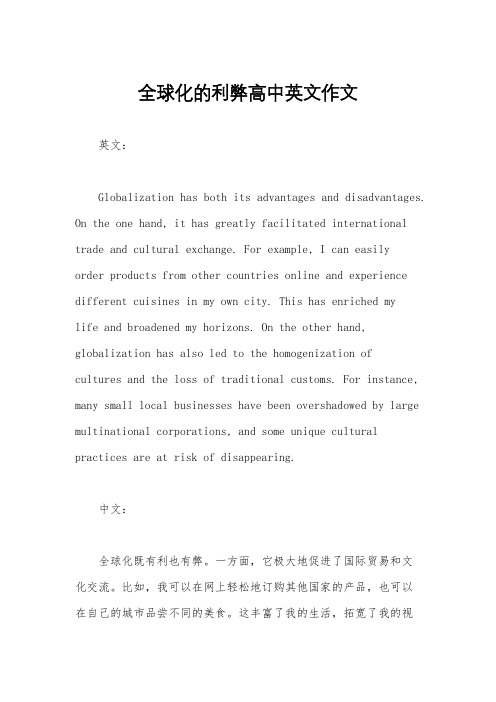
全球化的利弊高中英文作文英文:Globalization has both its advantages and disadvantages. On the one hand, it has greatly facilitated international trade and cultural exchange. For example, I can easilyorder products from other countries online and experience different cuisines in my own city. This has enriched mylife and broadened my horizons. On the other hand, globalization has also led to the homogenization ofcultures and the loss of traditional customs. For instance, many small local businesses have been overshadowed by large multinational corporations, and some unique cultural practices are at risk of disappearing.中文:全球化既有利也有弊。
一方面,它极大地促进了国际贸易和文化交流。
比如,我可以在网上轻松地订购其他国家的产品,也可以在自己的城市品尝不同的美食。
这丰富了我的生活,拓宽了我的视野。
另一方面,全球化也导致了文化同质化和传统习俗的流失。
比如,许多小型的本地企业被大型跨国公司所淹没,一些独特的文化习俗也面临消失的风险。
英语作文全球化的利弊
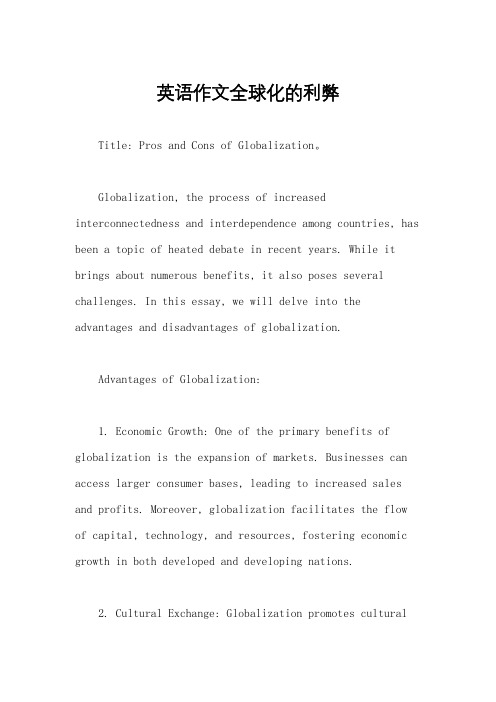
英语作文全球化的利弊Title: Pros and Cons of Globalization。
Globalization, the process of increased interconnectedness and interdependence among countries, has been a topic of heated debate in recent years. While it brings about numerous benefits, it also poses several challenges. In this essay, we will delve into the advantages and disadvantages of globalization.Advantages of Globalization:1. Economic Growth: One of the primary benefits of globalization is the expansion of markets. Businesses can access larger consumer bases, leading to increased sales and profits. Moreover, globalization facilitates the flow of capital, technology, and resources, fostering economic growth in both developed and developing nations.2. Cultural Exchange: Globalization promotes culturalexchange and diversity by facilitating the movement of people, ideas, and traditions across borders. This exposure to different cultures enriches societies, fosteringtolerance and understanding among people from diverse backgrounds.3. Technological Advancement: Globalization encourages technological innovation and diffusion. Companiescollaborate across borders to develop new technologies, leading to advancements in various fields such as communication, healthcare, and transportation. This technological progress enhances efficiency and productivity, benefiting both businesses and consumers.4. Access to Resources: Globalization allows countriesto access resources that may be scarce or unavailable domestically. Through trade agreements and partnerships, nations can secure essential resources like oil, minerals, and agricultural products, ensuring stability and sustainability in supply chains.5. Employment Opportunities: Globalization createsemployment opportunities by opening up new markets and industries. Multinational corporations invest in foreign countries, creating jobs and stimulating economic development. Additionally, outsourcing and offshoring practices enable businesses to reduce costs, ultimately benefiting consumers through lower prices.Disadvantages of Globalization:1. Income Inequality: Despite its economic benefits, globalization has exacerbated income inequality within and among countries. While some individuals and regions experience prosperity, others face displacement and job insecurity due to outsourcing and automation. Thisdisparity in wealth distribution can lead to social unrest and political instability.2. Cultural Homogenization: Critics argue that globalization leads to cultural homogenization, as Western values and consumerism become dominant worldwide. Local traditions and languages may be marginalized in favor of a globalized, homogenized culture, eroding cultural diversityand identity.3. Environmental Degradation: The increased interconnectedness of economies has also accelerated environmental degradation. Industrialization andintensified agricultural practices, driven by globalization, contribute to pollution, deforestation, and climate change. Moreover, global trade patterns result in the unsustainable exploitation of natural resources, further exacerbating environmental challenges.4. Loss of Sovereignty: Globalization challenges the sovereignty of nation-states, as multinational corporations and international organizations exert significant influence over economic and political decisions. Critics argue that globalization undermines democratic processes and national autonomy, leading to concerns about corporate hegemony and loss of control over domestic policies.5. Vulnerability to External Shocks: Interdependence among economies under globalization increasessusceptibility to external shocks and crises. Economicdownturns, financial crises, or geopolitical conflicts in one region can have ripple effects across the globe, destabilizing markets and economies worldwide.In conclusion, while globalization offers numerous benefits such as economic growth, cultural exchange, and technological advancement, it also presents challenges such as income inequality, cultural homogenization, and environmental degradation. To maximize the benefits and mitigate the drawbacks of globalization, policymakers must prioritize inclusive and sustainable development strategies that promote economic prosperity, cultural diversity, and environmental stewardship on a global scale.。
全球化的利与弊英语作文120词
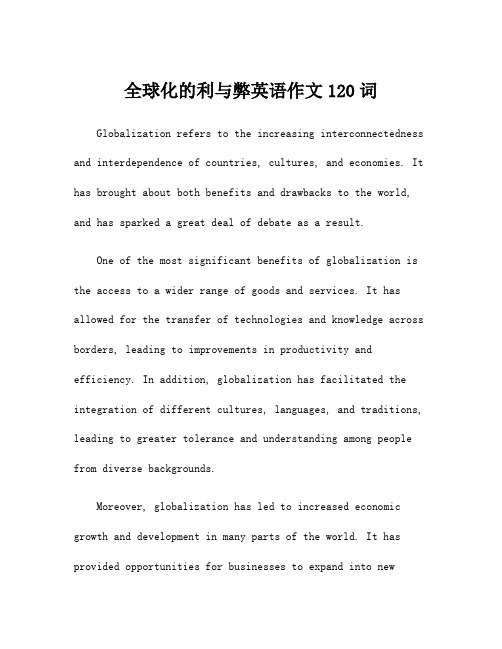
全球化的利与弊英语作文120词Globalization refers to the increasing interconnectedness and interdependence of countries, cultures, and economies. It has brought about both benefits and drawbacks to the world, and has sparked a great deal of debate as a result.One of the most significant benefits of globalization is the access to a wider range of goods and services. It has allowed for the transfer of technologies and knowledge across borders, leading to improvements in productivity and efficiency. In addition, globalization has facilitated the integration of different cultures, languages, and traditions, leading to greater tolerance and understanding among people from diverse backgrounds.Moreover, globalization has led to increased economic growth and development in many parts of the world. It has provided opportunities for businesses to expand into newmarkets, leading to job creation and wealth generation. Furthermore, globalization has also facilitated the flow of capital, allowing for investment in emerging economies and the development of infrastructure and resources.However, there are also drawbacks to globalization. One of the most pressing concerns is the unequal distribution of wealth and resources. While some countries and individuals have benefited greatly from globalization, others have been left behind, leading to increased inequality and poverty. Additionally, globalization has contributed to the homogenization of culture, with the spread of Western ideals and consumerism eroding local traditions and values.Furthermore, globalization has also led to environmental degradation and exploitation. The increased demand for resources and energy has led to unsustainable practices, leading to pollution and environmental degradation. Moreover,the outsourcing of production to developing countries has led to poor working conditions and exploitation of labor.In conclusion, globalization has brought about both benefits and drawbacks to the world. While it has provided opportunities for economic growth and cultural exchange, it has also led to increased inequality and environmental degradation. It is important for policymakers to address these challenges and work towards a more equitable and sustainable form of globalization.。
全球化的利弊作文高一英语作文

全球化的利弊作文高一英语作文English: Globalization, with its interconnectedness and interdependence among nations, presents both advantages and disadvantages. On the one hand, globalization fosters economic growth by promoting free trade, allowing for the exchange of goods and services across borders, and facilitating the flow of capital, technology, and knowledge. This can lead to increased efficiency, specialization, and innovation, benefiting both developed and developing countries. Moreover, globalization has facilitated cultural exchange, enabling people to appreciate diverse perspectives, traditions, and lifestyles. However, globalization also has its drawbacks. It can exacerbate income inequality within and between countries, as wealth tends to concentrate in the hands of a few global corporations and individuals. Additionally, globalization may threaten cultural identity and traditional practices as Western culture becomes dominant through media and multinational corporations. Furthermore, the interconnectedness of economies can lead to systemic risks, as demonstrated by the global financial crisis of 2008. In conclusion, while globalization offers opportunities for economic development and cultural exchange, its pitfalls require carefulconsideration and management to ensure a more equitable and sustainable global future.中文翻译: 全球化作为各国之间相互连接和相互依存的产物,既带来了优势,也存在着劣势。
全球化的好处和坏处英文作文

全球化的好处和坏处英文作文The Pros and Cons of Globalization.Globalization has become a significant force in today's interconnected world, shaping various aspects of life, from economics to culture and technology. It involves the integration of markets, ideas, and cultures across borders, leading to unprecedented levels of interdependence and exchange. While globalization offers numerous benefits, it also presents some challenges and potential downsides.Benefits of Globalization.1. Economic Growth and Prosperity: Globalization has fostered economic growth and prosperity by opening up new markets and opportunities for trade. It has enabledcountries to specialize in their areas of comparative advantage, leading to increased productivity and efficiency. Furthermore, it has facilitated the flow of capital, technology, and know-how, which has spurred innovation andtechnological advancement.2. Cultural Exchange and Understanding: Globalization has broken down cultural barriers, promoting the exchange of ideas, art, and traditions across borders. This has led to a more tolerant and understanding society, where people appreciate and embrace diverse cultural identities. It has also fostered creativity and innovation by bringing together different perspectives and insights.3. Improved Access to Resources: Globalization has made it easier for countries to access critical resources, such as food, energy, and raw materials. This has helped to alleviate poverty and improve living standards in many parts of the world. Additionally, it has enabled the sharing of knowledge and expertise, which has led to better health care, education, and infrastructure development.4. Global Collaboration and Problem-Solving: Globalization has facilitated international collaboration and cooperation on a range of global issues, such as climate change, poverty alleviation, and disease control.By working together, countries can pool their resources, expertise, and knowledge to address these challenges more effectively.Downsides of Globalization.1. Economic Inequality: While globalization has led to overall economic growth, it has also created economic disparities between countries and within countries. Some countries and regions have benefited more than others, leading to a widening gap between the rich and the poor. This inequality can lead to social tensions and political instability.2. Cultural Homogenization: As cultures mingle and influence each other, there is a concern that globalization may lead to the loss of cultural diversity and the homogenization of global culture. This can erode the unique identities and values of different cultures, leading to a loss of richness and variety.3. Environmental Degradation: Globalization has led toincreased industrialization and consumption, which has taken a heavy toll on the environment. Issues such as climate change, pollution, and deforestation are exacerbated by the unchecked growth and extractive practices associated with globalization.4. Job Displacement and Social Unrest: The influx of foreign goods and services into domestic markets can lead to job displacement and economic instability. This can create social unrest and political tension, as people struggle to adapt to the changing economic landscape. Additionally, the race to the bottom in terms of labor costs and regulations can lead to the exploitation of workers in some parts of the world.In conclusion, globalization is a complex phenomenon that brings both benefits and challenges. While it has fostered economic growth, cultural exchange, and global collaboration, it has also led to economic inequality, cultural homogenization, environmental degradation, and social unrest. It is important to recognize both the positives and the negatives of globalization and worktowards creating a more inclusive and sustainable global economy that benefits everyone.。
全球化的优缺点(英文)
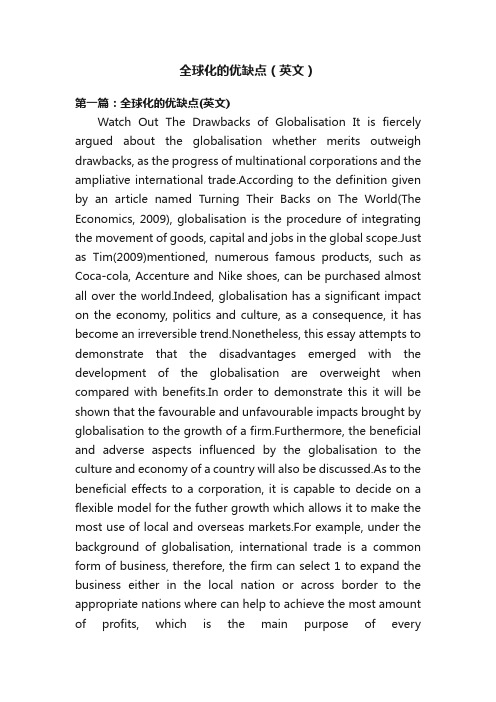
全球化的优缺点(英文)第一篇:全球化的优缺点(英文)Watch Out The Drawbacks of Globalisation It is fiercely argued about the globalisation whether merits outweigh drawbacks, as the progress of multinational corporations and the ampliative international trade.According to the definition given by an article named Turning Their Backs on The World(The Economics, 2009), globalisation is the procedure of integrating the movement of goods, capital and jobs in the global scope.Just as Tim(2009)mentioned, numerous famous products, such as Coca-cola, Accenture and Nike shoes, can be purchased almost all over the world.Indeed, globalisation has a significant impact on the economy, politics and culture, as a consequence, it has become an irreversible trend.Nonetheless, this essay attempts to demonstrate that the disadvantages emerged with the development of the globalisation are overweight when compared with benefits.In order to demonstrate this it will be shown that the favourable and unfavourable impacts brought by globalisation to the growth of a firm.Furthermore, the beneficial and adverse aspects influenced by the globalisation to the culture and economy of a country will also be discussed.As to the beneficial effects to a corporation, it is capable to decide on a flexible model for the futher growth which allows it to make the most use of local and overseas markets.For example, under the background of globalisation, international trade is a common form of business, therefore, the firm can select 1 to expand the business either in the local nation or across border to the appropriate nations where can help to achieve the most amount of profits, which is the main purpose of everycorporation.Moreover, To expand to other countries means that has a wider market owning new customer groups with various demands, which consequently means that there hides huge business opportunities and a more generous margins.In a word, the increasing liberalization of markets all over the world are provided by globalisation to give multinational companies access to customers and profit margin unexpected, as are stated by Tim in 2009.Adversely, in despite of so many advantages, the opposite aspects can not be ignored and weigh even more.Firstly, globalisation may lead the disadvantaged companies to the situation of bankruptcy.An example about the experience of companies in Galax ,which is described in the ” Hard Truth about Helping The Losers from Globalisation ”(The Economics, 2007), is here suitable for a valid support.In order to gain better development, a firm is much difficult to avoid the fierce competition in an open and liberal economic environment.However, such environment and conditions indeed do not avail for those weaker companies with low level of technology and productivity, low quality of the staff and more backward level of management, which are easier eliminated from the market than companies with a powerful and abundant strength.Secondly, in the open globe, corporations have to bear higher risk in 2 the process of merger, acquisition or engaging normal commercial activities.Before the implementation of a commercial decision, accurate expectation of earnings and reasonable capital amount of investment should be projected according to the repeated investigation to the target market, unless it could be suffered from several types of of risks, such as credit risk, market risk and capital risk, which may cause imponderable damages to the company, even may lead to theelimination from local market.Therefore, a company should weigh the advantages and disadvantages of globalisation, especially the drawbacks, and avoid risks as much as possible.In terms of the impacts to a country, cultural elements from all corners of the world are integrated into its culture to enrich the original cultural content.It can be seen from the worldspread of festivals.Numerous Western festivals such as the Christmas, the Valentine’s Day , the April Fool’s Day are celebrated annually in China, meanwhile, Chinese traditional festivals like the Spring Festival, the Mid-autumn Day are accepted by other nations.What’s more, in the economic aspect, globalisation makes it convenient to exchange advanced financial information and accelerate capital flow.Lewis considered that globalisation provides a chance to less developed countries to improve the situations through an integration with the global economy.It was supported by Friedman, a Nobel laureate, who believed that greater wealth creation was led to by economic freedom.In addition, so-called organisations like the IMF, the 3 World Trade Organisation and the World Bank always serve amount of infrastructure fund to countries that get into financial difficulties(Lewis,2005).Altogether, globalisation produces cultural and economic benefits to a country.However, disadvantages are ineluctable.From the viewpoint of Klein(1999), globalisation will lead to ‘homogenization’.Ritzer(2004)asserted that big brands can create destruction of traditional culture of a country through the procedure of globalisation.The young will distinct alien culture with traditional culture and will be gradually diluted about some traditional opinions which are accepted by three generations or even more.Therefore, many cultural elements will disappeared asthe development of cultural globalisation.Additionally, when it comes to the economic angle, the increased liquidity of capital brings about an unstable financial order, which will easily detonate economic crisis.Spreading through the economic ties, the crisis will evolve into a major crisis in a scope of globe.From other aspects, just as Lewis stressed, If the IMF and the World Bank were shut down, the developing countries would even worse duing to the diminished flow of resources served by these two international organizations.As presented above, globalisation can impact a country on the culture and economy to a significant extent.In conclusion, this essay has demonstrated that the disadvantages of globalisation impact on a firm and a nation far more significant than 4 advantages.Indeed, to a firm, globalisation provides a series of chances to expand market to multinational area and gain more profits, however, the company should also bear the risks brought by it.When considering to a country, evidence suggests that a richer content of culture can be formed through integration of global cultural elements, while it may detonate cultural homogenization.Furthermore, in economic aspect, although globalisation can service a convenience to acquire advanced information and the chance of improvement, it may cause the risk of global economic crisis and a potencial possibility of being even worse.Despite the fact that drawbacks are more than benefits, firms and nations can find an appropriate way to make the most of the advantages and to avoid disadvantages as possible.References The Economist print edition, 18th Jan 2007, ‘Hard Truths about Helping The Losers From Globalisation’.Lewis W(2005),Globalisation: Good or Bad? Guardian Unlimited.Klein N(2005), No Logo, HarperCollins Publishers, London.Ritzer G(2004), The McDonaldization ofsociety.Revised New Century Edition.Pine Forge Press, California.Tim H(2009), The Economist Guide to Management Ideas and Gurus.第二篇:全球化Globalization英文论述Globalization Globalization is the process of international integration arising from the interchange of world views, products, ideas and other aspects of culture.Advances in transportation and telecommunications infrastructure, including the rise of the telegraph and its posterity the Internet, are major factors in globalization, generating further interdependence of economic and cultural activities.World have connection into a whole, forming a global village.Nowadays no one nation can go out of the world and the development of the closed.Economic globalization:Economic globalization is the increasing economic interdependence of national economies across the world through a rapid increase in cross-border movement of goods, service, technology and capital.Whereas the globalization of business is centered around the diminution of international trade regulations as well as tariffs, taxes, and other impediments that suppresses global trade, economic globalization is the process of increasing economic integration between countries, leading to the emergence of a global marketplace or a single world market.The world economy is very close.A country's economic crisis is likely to affect the worldsocio-cultural globalization:Cultural globalization has increased cross-cultural contacts but may be accompanied by a decrease in the uniqueness of once-isolated communities.Such as rock, jeans, such as Coca-Cola spread around the world.For example, sushi is available in Germany as well as Japan but Euro-Disney outdraws the city of Paris, potentially reducing demandfor “authentic” French pastry.Globalization's contribution to the alienation of individuals from their traditions may be modest compared to the impact of modernity itself.Globalization has expanded recreational opportunities by spreading pop culture, particularly via the Internet and satellite television.the Internet connects computer users around the world.From 2000 to 2009, the number of Internet users globally rose from 394 million to 1.858 billion.By 2010, 22 percent of the world's population had access to computers with 1 billion Google searches every day, 300 million Internet users reading blogs, and 2 billion videos viewed daily on YouTube.The example of globalization:AIRBUS,ADIDAS.Globalization has a lot of good or bad influence to us.First talk about the positive: worldwide the number of common standards;the growth of international trade faster than the world economic growth;the proportion of multinational companies in the world economy;the development of the global financial system;and More and more international cultural influence, such as through the export of Hollywood movies;promote the development of international tourism;a lot of information resources sharing via the Internet.The bad influence is the widening gap between the rich and poor;the increase of illegal immigrants;The expansion of terrorism;Its unemployment rate increaseThe Finally, statement about my point of view.The trend of globalization is irreversible, we should conform to this trend, we should not go against globalization.If you resist the globalization is obvious, north Korea is resist globalization, so the economy is backward, and there also very miserably of people's life.Globalization makes countries can share resources, cheap goods, technology have very convenient also, human resourcesalso can free flow between countries, promote the prosperity of the national economy.At the same time, also promote the spread of cultural globalization, cultural communication is also more frequently, is conducive to the development of national culture.Although a lot of the benefits of globalization, but also should pay attention to protect our country own business brand, technology, enhance the value of the independent brand, pay attention to brand building, in this way, can we have their own advantages in the globalization.第三篇:全球化英文演讲稿This is opposites becomes globalization,we know that some place’s economics get great,however some poorest than they ever before.Should we promote globalization or not? Is globalization the arch-criminal to the poverty gap ?What is globalization ?That is ,diffuse market economy from one country to all of the world,make capitalism cover every corner of the globe.And we all know, if one country carry out the Capitalism and market economy in the same time ,it can get great efficiency ,increase the productivity.But everybody knows market economy have its own shortcomings ,first,it can lead to poverty gap easily.The rich richer, the poor poorer.This is the nature of the market economy.But, because of this, we should stop globalization ?If there is no globalization, how the Multi-National Corporation make Listing and financing, put their product to every place in the world to every people’s life.If there is no globalization,many problem couldn’t be solved by peace ways.Like country in Africa get independent.;the chemical weapon in Syria.If there is no globalization ,people with different color skin couldn’t understand each other.our Chinese civilization could not get famous.Just like an old going says,onecoins has two sides.Globalization is an inevitable trend, and do good to humas’s Fusion and development.We shouldn’t escape.So we should do some things to solve the poverty gap.We can make different tax rate to different people according to income;The richer the more.Open more market, reduce the cost of living;Strengthen the social welfare.Just like Politician Marchinde says: society becomes greater after it gets damaged. 第四篇:英文出国优缺点The advantages and disadvantages of of studying abroadSome people believe that attending a college or university in a foreign country has many advantages.They think that attending a college or university abroad can help them learn more than they can from universities in their own country, especially when they go to a developed country where they can catch up with the pace of scientific and technical advance of the world from that country' s modern lab facilities.In addition, they can pick up the latest developments of the living language there more quickly, develop their ability of coping with the routine matters such as finding a part-time job, renting a house and helping with the house work, and learn many new things to widen their views and broaden their minds.But some people don't agree to it.They think that attending a college or university in foreign country also has many disadvantages and the disadvantages outweigh the advantages.They hold that students studying in a foreign country will have more difficulties in both life and study.The most serious problem is the language barriers.They have to spend much time learning a foreign language and even if they have learned the language, they still can' t understand thoroughly what the foreigners and teachers say just because of the unfamiliar culture background and social customs.So ff they are not persons full ofcourage, flexibility, and determination, they are most likely to fail and learn nothing eventually.Besides, since costs and expenditure are much higher than those in their native country, most overseas students have to work for a living, and will find it impossible for them to pay all attention to studying.So it is of benefit to them if they study in their own country.The above two viewpoints, I should say, are all reasonable in some respects.But I support the first kind of people.I think people should attend a college or university in a foreign country ff they can.In this way they can learn not only the useful knowledge of science but also the culture and Customs of other nations.Besides, they can learn some new ideas and, when they come back, bring in some fresh air in our way of thinking and promote the development of our country.If nobody went to study abroad because of the disadvantages, the development of our country would be slower.2013131231 Wang Ruxia Mar.21.2015第五篇:全球化利弊的英文辩论周:全球化利大于弊丁:全球化弊大于利立论陈词:正方:大家好我方认为全球化利大于弊全球化可以解释为世界的压缩和视全球为一个整体。
全球化的利弊-英语

全球化的利弊-英语(总1页)--本页仅作为文档封面,使用时请直接删除即可----内页可以根据需求调整合适字体及大小--For the advantages, firstly, because of the various output from different countries, consumers have more chances to enjoy different kinds of goods from other countries, which can improve their quality of life. Secondly, as some countries are lack of some resources, they can benefit from the globalization because they can import the resources which they don’t have or are lack of, such as the labors, technology, raw material and so on. Thirdly, the globalization can promote the development of the international division of labor and cooperation, and it can also be useful for the efficient allocation of resources. What’s more, in the aspect of culture and politics, it can promote people in different countries to communicate with each other, and there would be less conflict in some cultural and political affairs.For the disadvantages, firstly,Secondly, the globalization intensifies the imbalances of the world economic, especially the imbalances between the developed countries and developing countries. Finally, the globalization also has certain impact on the national culture. Like the economic integration, there is also culture integration, which causes some traditional cultures in certain countries been abandoned by their people.Secondly, I think that the conflict will increase. Globalization gives people more opportunities to communicate with others in other nations, but the huge diversity of religion, race and education still make it hard to get along in harmony.Thirdly, globalization will increase the possibility of culture hegemony and decrease the cultural diversity. Culture of nations interweaves together by frequent culture exchange. The culture of the nation is very easily influenced by other mainstream culture.Benefits:Firstly, globalization can accelerate the spread of the advanced technology so to accelerate the development of the world.Secondly, developing countries can benefits a lot from the globalization. They can grasp the opportunities to develop their economy relying on the technological and financial aid.Thirdly, our life will become more convenient we can easily get the goods and product of others countries in the ordinary supermarket.。
全球化对经济利弊英语作文
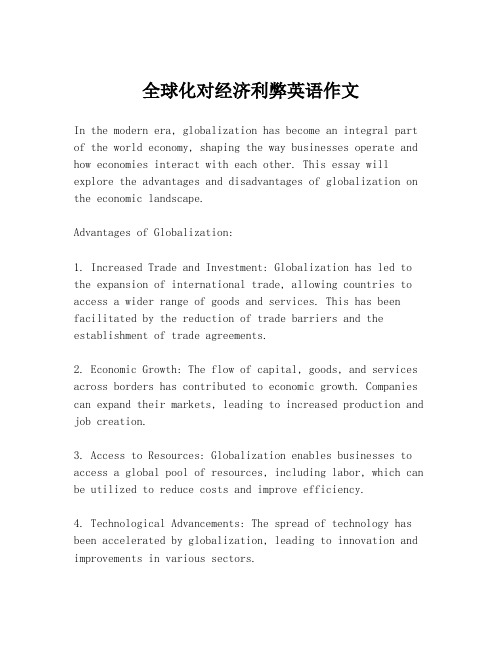
全球化对经济利弊英语作文In the modern era, globalization has become an integral part of the world economy, shaping the way businesses operate and how economies interact with each other. This essay will explore the advantages and disadvantages of globalization on the economic landscape.Advantages of Globalization:1. Increased Trade and Investment: Globalization has led to the expansion of international trade, allowing countries to access a wider range of goods and services. This has been facilitated by the reduction of trade barriers and the establishment of trade agreements.2. Economic Growth: The flow of capital, goods, and services across borders has contributed to economic growth. Companies can expand their markets, leading to increased production and job creation.3. Access to Resources: Globalization enables businesses to access a global pool of resources, including labor, which can be utilized to reduce costs and improve efficiency.4. Technological Advancements: The spread of technology has been accelerated by globalization, leading to innovation and improvements in various sectors.5. Cultural Exchange: Economic ties often lead to cultural exchanges, fostering mutual understanding and cooperation among nations.Disadvantages of Globalization:1. Inequality: While some benefit from globalization, it can also exacerbate income inequality. Multinational corporations may profit significantly, while local businesses and workers can suffer.2. Cultural Homogenization: The spread of global brands and cultures can lead to a loss of local identities and traditions, as they are overshadowed by dominant global cultures.3. Economic Vulnerability: Global interconnectedness means that economic downturns in one country can quickly spread to others, as seen in the global financial crisis of 2008.4. Labor Exploitation: In the pursuit of lower costs, some companies may shift production to countries with lax labor laws, leading to exploitation and poor working conditions.5. Environmental Concerns: The increase in production and transportation for global markets can lead to greater environmental degradation and resource depletion.In conclusion, globalization has both the potential to enrich and to impoverish the global economy. It is a complex phenomenon that requires careful management to ensure thatits benefits are widely distributed and its drawbacks are mitigated. Policymakers, businesses, and individuals must work together to harness the positive aspects of globalization while addressing its challenges.。
全球化的利弊总结英语作文
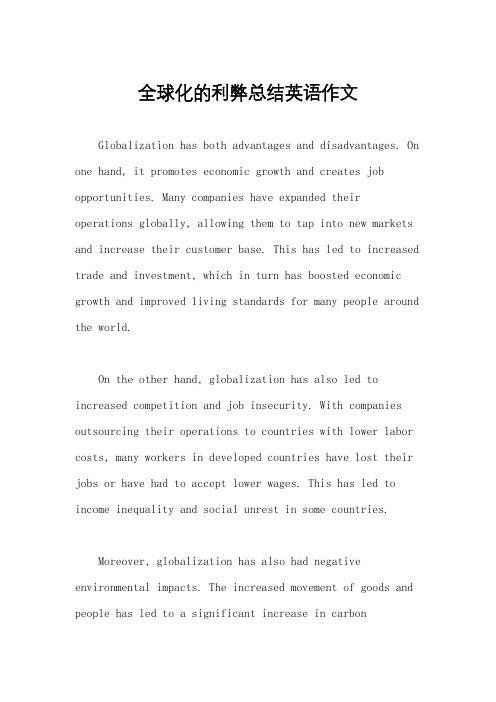
全球化的利弊总结英语作文Globalization has both advantages and disadvantages. On one hand, it promotes economic growth and creates job opportunities. Many companies have expanded their operations globally, allowing them to tap into new markets and increase their customer base. This has led to increased trade and investment, which in turn has boosted economic growth and improved living standards for many people around the world.On the other hand, globalization has also led to increased competition and job insecurity. With companies outsourcing their operations to countries with lower labor costs, many workers in developed countries have lost their jobs or have had to accept lower wages. This has led to income inequality and social unrest in some countries.Moreover, globalization has also had negative environmental impacts. The increased movement of goods and people has led to a significant increase in carbonemissions and pollution. This has contributed to climate change and the degradation of natural resources. Additionally, the exploitation of resources in developing countries to meet the demands of developed countries has led to environmental degradation and social injustices.Another disadvantage of globalization is the loss of cultural diversity. As Western culture spreads globally, traditional customs and languages are being eroded. This can lead to a loss of identity and a homogenization of cultures. Furthermore, the dominance of Western media and entertainment can perpetuate stereotypes and distort perceptions of different cultures.However, globalization has also brought about positive social and cultural changes. It has facilitated the exchange of ideas and knowledge, leading to cultural enrichment and the promotion of understanding and tolerance among different societies. This has allowed people to learn from each other and appreciate the diversity of the world.In conclusion, globalization has both advantages anddisadvantages. While it has brought economic growth and improved living standards, it has also led to job insecurity, environmental degradation, and cultural homogenization. It is important for policymakers to address these challenges and find ways to mitigate the negative impacts of globalization while maximizing its benefits.。
全球化的利弊英文200字
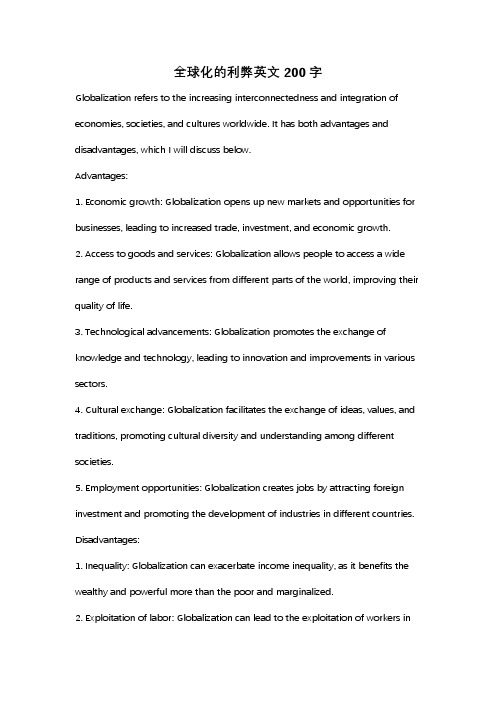
全球化的利弊英文200字Globalization refers to the increasing interconnectedness and integration of economies, societies, and cultures worldwide. It has both advantages and disadvantages, which I will discuss below.Advantages:1. Economic growth: Globalization opens up new markets and opportunities for businesses, leading to increased trade, investment, and economic growth.2. Access to goods and services: Globalization allows people to access a wide range of products and services from different parts of the world, improving their quality of life.3. Technological advancements: Globalization promotes the exchange of knowledge and technology, leading to innovation and improvements in various sectors.4. Cultural exchange: Globalization facilitates the exchange of ideas, values, and traditions, promoting cultural diversity and understanding among different societies.5. Employment opportunities: Globalization creates jobs by attracting foreign investment and promoting the development of industries in different countries. Disadvantages:1. Inequality: Globalization can exacerbate income inequality, as it benefits the wealthy and powerful more than the poor and marginalized.2. Exploitation of labor: Globalization can lead to the exploitation of workers indeveloping countries, where labor standards and regulations may be weaker. 3. Environmental challenges: Globalization contributes to environmental degradation through increased production, transportation, and consumption, leading to pollution and resource depletion.4. Loss of cultural identity: Globalization can lead to the homogenization of cultures, as dominant global influences may overshadow local traditions and customs.5. Economic volatility: Globalization can make economies more vulnerable to financial crises and economic fluctuations, as they become more interconnected and interdependent.In conclusion, while globalization offers numerous benefits such as economic growth and cultural exchange, it also presents challenges such as inequality and environmental degradation. To maximize its benefits and mitigate its drawbacks, it is essential to promote fair trade practices, protect workers' rights, and prioritize sustainable development.。
全球化影响的利弊英语作文

全球化影响的利弊英语作文Globalization has both positive and negative impacts on the world today. 全球化对当今世界产生了正面和负面影响。
On one hand, it has connected people from all over the world through increased communication and exchange of ideas. 一方面,全球化通过增加沟通和思想交流,连接了来自世界各地的人们。
This has led to a better understanding of different cultures and perspectives. 这导致了对不同文化和观点的更好理解。
Globalization has also promoted economic growth and lifted many people out of poverty. 全球化还促进了经济增长,使许多人摆脱了贫困。
However, it has also led to the homogenization of cultures and the loss of local traditions. 然而,它也导致了文化同质化和当地传统的丧失。
One of the benefits of globalization is the increased access to information and technology. 全球化的一个好处是增加了对信息和技术的获取。
People can now easily connect with others from different countries and share knowledge and ideas. 人们现在可以轻松地与来自不同国家的人联系,并分享知识和思想。
全球化的利弊

• 19th century Great Britain became the first global economic superpower, because of superior manufacturing technology and improved global communications such as steamships and railroads.
Байду номын сангаас
Modern international sports events can be big business for as well as influencing the political, economical, and other cultural aspects of countries around the world. Especially with politics and sports, sports can affect countries, their identities, and in consequence, the world. 现代国际体育赛事可以大企业以及影响 政治,经济,和世界各国的文化的其他 方面。特别是政治和体育,体育可以影 响的国家,他们的身份,因而,世界。
After the Second World War, work by politicians led to the Bretton Woods conference, an agreement by major governments to lay down the framework for international monetary policy, commerce and finance, and the founding of several international institutions intended to facilitate economic growth multiple rounds of trade opening simplified and lowered trade barriers.
全球化的利弊英语作文

全球化的利弊英语作文篇一:全球化的英语作文Globalization and Internet (全球化/Internet)The drawing vividly unfolds …(Describe the picture描述图画)This phenomenon which this picture points out is one of numerous international phenomena to have become common and already attracted broad attention in the world in recent years. Globalization/Internet, in brief, makes the whole world a small village. Globalization/Internet offers extensive opportunities for every country in the world to develop their economy, improve their regime, eich their culture, update their technology and so forth, butglobalization/Internet is a two-edged sword: it can bring bothbenefit and harm. (Present state/situation现象描述+ /Meaning含义)这幅图画指出的这个现象是近几年在世界上众多已经变得普遍并且已经引起了广泛关注的国际/世界现象之一。
全球化/Internet,简言之,就是使整个世界变成一个小村子。
全球化/Internet给予了这个世界上的每一个国家广泛的机会去发展它们的经济、改善它们的政体、丰富它们的文化、更新它们的技术等等,但全球化/Internet是一把两刃剑:既有利的一面,也有害的一面。
全球化的利弊 英语作文
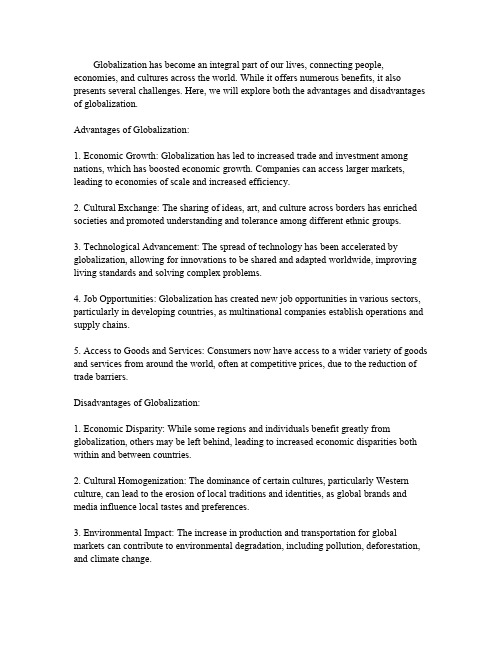
Globalization has become an integral part of our lives,connecting people, economies,and cultures across the world.While it offers numerous benefits,it also presents several challenges.Here,we will explore both the advantages and disadvantages of globalization.Advantages of Globalization:1.Economic Growth:Globalization has led to increased trade and investment among nations,which has boosted economic panies can access larger markets, leading to economies of scale and increased efficiency.2.Cultural Exchange:The sharing of ideas,art,and culture across borders has enriched societies and promoted understanding and tolerance among different ethnic groups.3.Technological Advancement:The spread of technology has been accelerated by globalization,allowing for innovations to be shared and adapted worldwide,improving living standards and solving complex problems.4.Job Opportunities:Globalization has created new job opportunities in various sectors, particularly in developing countries,as multinational companies establish operations and supply chains.5.Access to Goods and Services:Consumers now have access to a wider variety of goods and services from around the world,often at competitive prices,due to the reduction of trade barriers.Disadvantages of Globalization:1.Economic Disparity:While some regions and individuals benefit greatly from globalization,others may be left behind,leading to increased economic disparities both within and between countries.2.Cultural Homogenization:The dominance of certain cultures,particularly Western culture,can lead to the erosion of local traditions and identities,as global brands and media influence local tastes and preferences.3.Environmental Impact:The increase in production and transportation for global markets can contribute to environmental degradation,including pollution,deforestation, and climate change.4.Job Displacement:Globalization can lead to job losses in certain sectors,particularly in developed countries,as companies outsource labor to places with lower wages or invest in automation.5.Vulnerability to Global Crises:The interconnectedness of the global economy means that problems in one part of the world can quickly spread,as seen with financial crises or pandemics.Balancing the Pros and Cons:To maximize the benefits of globalization while minimizing its drawbacks,it is essential for governments,businesses,and individuals to work together.This includes implementing policies that protect workers and the environment,fostering sustainable development,and promoting cultural diversity.In conclusion,globalization is a complex phenomenon with farreaching implications.It is not without its challenges,but with careful management and a commitment to fairness and sustainability,it can be a powerful force for positive change in the world.。
全球化的利弊-英语

For the advantages, firstly, because of the various output from different countries, consumers have more chances to enjoy different kinds of goods from other countries, which can improve their quality of life. Secondly, as some countries are lack of some resources, they can benefit from the globalization because they can import the resources which they don’t have or are lack of, such as the labors, technology, raw material and so on. Thirdly, the globalization can promote the development of the international division of labor and cooperation, and it can also be useful for the efficient allocation of resources. What’s more, in the aspect of culture and politics, it can promote people in different countries to communicate with each other, and there would be less conflict in some cultural and political affairs.For the disadvantages, firstly,Secondly, the globalization intensifies the imbalances of the world economic, especially the imbalances between the developed countries and developing countries. Finally, the globalization also has certain impact on the national culture. Like the economic integration, there is also culture integration, which causes some traditional cultures in certain countries been abandoned by their people.Secondly, I think that the conflict will increase. Globalization gives people more opportunities to communicate with others in other nations, but the huge diversity of religion, race and education still make it hard to get along in harmony.Thirdly, globalization will increase the possibility of culture hegemony and decrease the cultural diversity. Culture of nations interweaves together by frequent culture exchange. The culture of the nation is veryeasily influenced by other mainstream culture.Benefits:Firstly, globalization can accelerate the spread of the advanced technology so to accelerate the development of the world.Secondly, developing countries can benefits a lot from the globalization. They can grasp the opportunities to develop their economy relying on the technological and financial aid.Thirdly, our life will become more convenient we can easily get the goods and product of others countries in the ordinary supermarket.。
- 1、下载文档前请自行甄别文档内容的完整性,平台不提供额外的编辑、内容补充、找答案等附加服务。
- 2、"仅部分预览"的文档,不可在线预览部分如存在完整性等问题,可反馈申请退款(可完整预览的文档不适用该条件!)。
- 3、如文档侵犯您的权益,请联系客服反馈,我们会尽快为您处理(人工客服工作时间:9:00-18:30)。
For the advantages, firstly, because of the various output from different countries, consumers have more chances to enjoy different kinds of goods from other countries, which can improve their quality of life. Secondly, as some countries are lack of some resources, they can benefit from the globalization because they can import the resources which they don’t have or are lack of, such as the labors, technology, raw material and so on. Thirdly, the globalization can promote the development of the international division of labor and cooperation, and it can also be useful for the efficient allocation of resources. What’s more, in the aspect of culture and politics, it can promote people in different countries to communicate with each other, and there would be less conflict in some cultural and political affairs.
For the disadvantages, firstly,Secondly, the globalization intensifies the imbalances of the world economic, especially the imbalances between the developed countries and developing countries. Finally, the globalization also has certain impact on the national culture. Like the economic integration, there is also culture integration, which causes some traditional cultures in certain countries been abandoned by their people. Secondly, I think that the conflict will increase. Globalization gives people more opportunities to communicate with others in other nations, but the huge diversity of religion, race and education still make it hard to get along in harmony.
Thirdly, globalization will increase the possibility of culture hegemony and decrease the cultural diversity. Culture of nations interweaves together by frequent culture exchange. The culture of the nation is very easily influenced by other mainstream culture.
Benefits:
Firstly, globalization can accelerate the spread of the advanced technology so to accelerate the development of the world.
Secondly, developing countries can benefits a lot from the globalization. They can grasp the opportunities to develop their economy relying on the technological and financial aid.
Thirdly, our life will become more convenient we can easily get the goods and product of others countries in the ordinary supermarket.。
